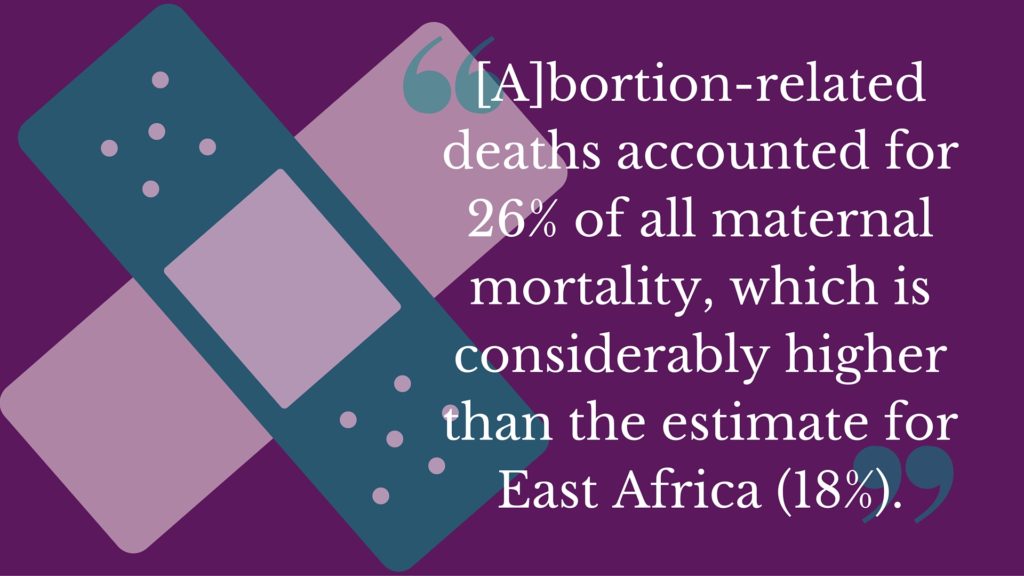You have surely heard of the constant barrage of legal attacks on abortion in the US. At MSFC, we are known for working to battle this onslaught of legislation by helping to create the next generation of abortion providers. Our efforts are especially important because women in the US are facing challenges to accessing abortion that rival the pre-Roe era. However, this problem is not restricted to North America. Nearly half of all abortions worldwide are unsafe, and nearly all unsafe abortions (98%) occur in developing countries. The MSFC network has made bold strides in addressing these challenges in the US and Canada, and now MSFCers, such as Grace, are fighting for access to safe abortion internationally.
Grace is from Uganda, where there are unclear legal restrictions on abortion and high rates of unintended pregnancy due to a lack of contraceptives[1]. Poor and rural women are disproportionately affected by the lack of abortion providers because of financial and geographic restraints. Without access to the necessary family planning tools, women resort to seeking abortions from untrained providers using unsafe methods or attempting to self-induce an abortion. However, this problem is not just restricted to poor women. Women with a greater socioeconomic status may have more access to abortion providers, but legal restrictions often requires providers to perform the procedure clandestinely, increasing the danger and financial cost of the service.
The Ugandan Ministry of Health estimated in 2008 that abortion-related deaths accounted for 26% of all maternal mortality, which is considerably higher than the estimate for East Africa (18%). Even more women suffer injuries from unsafe procedures, and Grace tells us that “many of these mothers come in with excessive bleeding.” Unsurprisingly, poor and rural women experience most of these complications at an estimated 68-75%. When women do have complications, they delay going to a health care provider for fear they will receive judgmental or abusive treatment. To further exacerbate this crisis, many nurses and midwives who are legally permitted to provide post-abortion care do not have proper training.
Through educating herself and others, Grace is changing the landscape of abortion in Uganda. After finding MSFC through a Google search, Grace founded a chapter at her university in Uganda, arranged a Reproductive Health Externship at a Planned Parenthood clinic in California, and attended an Abortion Training Institute. Only two weeks into her ob-gyn rotation, Grace tells us that she “has done fifteen Manual Vacuum Aspirations[2] and all my mothers are doing very well after a week’s review.” Grace is passing on her knowledge as well, stating, “I have also managed to teach many students how to use an MVA.”
At MSFC, we believe that the key to keeping choice and women alive is by training and supporting future providers like Grace. Grace recently wrote to us, “I am glad to have saved a lot of lives, and I attribute this to the training, support and encouragement I have received from each one of you. I feel very happy about my work, and each time I think about the training I have had through MSFC, I just can’t imagine how much I can thank you. I now feel more confident to continue my work and pray that I perfect my skills, teach many more people, and maybe someday we shall get to the end of the road. Thanks to Planned Parenthood, thanks to MSFC, and God bless every one of you. Please continue supporting us as we support many more to live the lives they dream.”
We are so proud and humbled by everything Grace has accomplished. We will always support those seeking to make abortion safe and accessible.
[1] To learn more about the state of abortion in Uganda, visit https://www.guttmacher.org/pubs/FB-Abortion-in-Uganda.html.
[2] Manual Vacuum Aspiration (MVA) is one of the safest medical procedures used to end a pregnancy up to twelve weeks into the pregnancy.

